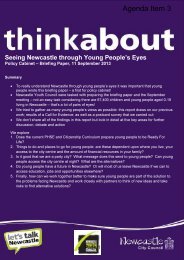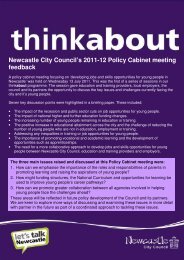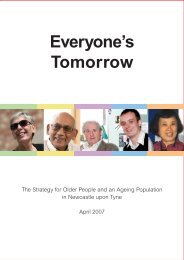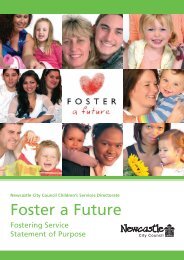NEWCASTLE'S MUSICAL HERITAGE AN INTRODUCTION By ...
NEWCASTLE'S MUSICAL HERITAGE AN INTRODUCTION By ...
NEWCASTLE'S MUSICAL HERITAGE AN INTRODUCTION By ...
You also want an ePaper? Increase the reach of your titles
YUMPU automatically turns print PDFs into web optimized ePapers that Google loves.
egs to announce his intention of now experimentally abolishing it for an entire<br />
Season’<br />
Even in 1899 the call of nature could not be ignored but as any such reference<br />
to bodily functions was taboo in polite Victorian Society I found myself intrigued<br />
as to how the matter would be resolved. A notice headed ‘THE INTERVAL’ in the<br />
next concert programme held the answer.<br />
‘The question as to the abolition of the Interval, which (at the request of a<br />
number of Subscribers) has been realised this season by Mr HARRISON, is<br />
evidently one which will not secure unanimity of sentiment, whichever way it is<br />
eventually decided, since the opinions of the general body of the Subscribers, so<br />
far as they have been at present expressed, vary very much.<br />
Some Subscribers dislike the change because it does not give the opportunity for<br />
meeting and chatting with friends in other parts of the Hall, whilst on the other<br />
hand, a number of Subscribers welcome the change for exactly the same reason,<br />
since they contend that an interval sufficiently long for this purpose, either means<br />
a curtailment of the Programme which might otherwise be presented, or else that<br />
the performance of the later items of the Programme is interfered with by the<br />
necessary exodus of many persons leaving before the end of the Concert, in<br />
order to catch their trains.<br />
Other Subscribers have remarked that although they do not desire a long<br />
Interval, they would like just a short Interval, or break, in the middle of the<br />
programme, and this is the view which will probably be taken by the majority of<br />
the Subscribers.<br />
Mr HARRISON has a perfectly open mind upon the question, his only desire<br />
being to carry out such arrangements as will best conduce to the comfort, and<br />
meet the wishes, of the audiences, and with a view of ascertaining this, he<br />
proposes to limit the experiment of no Interval to the present concert (instead of<br />
continuing it through the entire season as originally announced) and to then take<br />
a plebiscite of his Subscribers as to the arrangements to be made for the future’<br />
Needless to say nothing further was heard of this cost cutting exercise.<br />
I have attempted in this chapter to include as many as possible of the more<br />
famous musical personalities that appeared in Newcastle during this musically<br />
fertile period but there will be others, who for one reason or another have been<br />
left out. Some of those I have mentioned paid repeated visits to the town, others<br />
may have appeared only once. Such as the French composer, organist, teacher<br />
and critic, Charles Widor (1844-1937), a name well enough known today but for<br />
one piece only, the Toccata movement from his fifth symphony, played at all the<br />
best weddings often as an alternative to the Mendelssohn or Wagner wedding<br />
marches. He performed in St Nicholas’ in 1891 at the opening of the Grand<br />
Organ. Tamara Karsavina, one of the greatest Russian ballerinas, who left<br />
Russia after the Bolshevik Revolution, gave a flying matinee (there and gone<br />
within hours) performance at the Hippodrome, Northumberland Road, in 1919.<br />
76

















